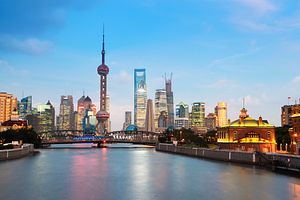The Chinese Communist Party’s relationship with the private sector is a sensitive one, both in ideological and practical terms. Though it remains a nominally communist state, China’s role as an economic superpower is owed entirely to the fundamental overhaul of its state-controlled economy. Starting with Deng Xiaoping’s “Reform and Opening” campaign in 1978, the government gradually ceded control over the last 30 years to unleash the forces of private ownership and the free market across the country.
China’s economy is now a curious, and perhaps precarious blend of government and market — of unbounded private entrepreneurship and mammoth state enterprise, between the invisible hand of the market and the cautious grip of the Party. The official buzzword for the model — “Socialist Market Economy” — gives full expression to these inherent tensions.
This was brought to the fore last July when China’s stock market went into freefall, plunging more than 40 percent from June to August. The government response was clumsy and heavy-handed. It threatened to arrest short-sellers and suspended IPOs, while state media pulled out all the stops to buoy investor sentiment. A “national team” of state-directed investors was also convened to inject 1.5 trillion RMB ($230 billion) to prop up share prices. Although the stock market has since stabilized, these panic-stricken measures indicate that China may now be at the mercy of market forces beyond its traditionally iron-grip control.
The same can now be said about private entrepreneurs in China, where the number of dollar billionaires now ranks higher than within the United States. Starting in 2001, many business leaders were courted by then-general secretary Jiang Zemin to become members of the party, in an effort to align political power and the burgeoning forces of private industry. However, Chinese tycoons may now be joining journalists and human-rights lawyers as targets on the government’s broadening crackdown on dissent.
Earlier this month, outspoken property developer and party member Ren Zhiqiang, often touted as the Chinese Donald Trump, was severely reprimanded on several state media platforms. Having garnered a reputation beyond entrepreneurial success by publishing blunt criticism on economic inequality and party leadership, Ren’s social media account was abruptly shut down and an ominous warning was issued by a central party committee that that he would be “dealt with seriously.”
This is in addition to the recent disappearances of several high-profile business leaders, such as Guo Guangchang, founder of the country’s largest conglomerate, allegedly in connection with an anti-graft investigation. The Financial Times reported this month that Ren’s predicament had stoked deep anxiety among the business elite, with some drawing parallels to the political persecutions of the Cultural Revolution. This is liable to increase the immense capital outflows out of the country that has seen wealthy Chinese hoard their assets abroad.
The deepening fault lines between the party and the private sector come at a fragile period in China’s development. During the country’s annual parliamentary session earlier this month, the leadership highlighted that amidst flagging economic growth, China needs to address industrial overcapacity and worrying levels of debt endemic to state-owned enterprises. Premier Li Keqiang stated unambiguously that “for those ‘zombie enterprises’ with absolute overcapacity, we must ruthlessly bring down the knife.” Discussions over the inevitability of mass-layoffs and where the debt burdens will fall have proved controversial.
As China navigates the difficult transition from a manufacturing to a consumption-led economy, the private sector looks ready to pick up the slack left by heavy industry. Indeed, some say that it has done so all along. In his 2014 book Markets over Mao, Nicholas Lardy finds that almost all the jobs in Chinese cities that have been created since 1978 have been in the private sector, and today, it accounts for two-thirds of economic output. Private businesses also significantly outperform their state-owned counterparts on multiple counts, including levels of productivity, overall shares of exports, and investment growth. As The Economist notes, “China’s best chance of weathering the current storm lies in the resilience and dynamism of the private sector.”
In recognition of its own dire need to undertake greater economic reform, the Chinese leadership must balance its instinct for control with the tradition of forward-looking pragmatism that has brought China to where it is today.
Jonathan Dove is a student at the University of Law in London. He has completed traineeships with the EU Delegation to China and the German Marshall Fund in Brussels

































